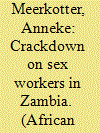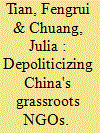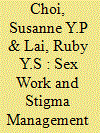|
|
|
Sort Order |
|
|
|
Items / Page
|
|
|
|
|
|
|
| Srl | Item |
| 1 |
ID:
115211


|
|
|
|
|
| Publication |
2012.
|
| Summary/Abstract |
In May 2012, Zambia's Inspector-General of Police announced a crackdown on sex workers. This commentary discusses the rationale behind this proposed crackdown and the problems associated with such a policy response.
|
|
|
|
|
|
|
|
|
|
|
|
|
|
|
|
| 2 |
ID:
185622


|
|
|
|
|
| Summary/Abstract |
This article employs ethnographic fieldwork and interviews to examine two distinct processes of depoliticization by non-governmental organizations advocating rights for sex workers in China. Drawing upon Bourdieu and institutional theory, we argue that the consolidation of state repression of civil society under the Xi regime created an institutional field of power to which two NGOs responded differently. While one of them relied on government procurement as its major funding source, thus diluting the original mission, the other internalized state rhetoric as it sought political legitimacy through state certification, thus sanitizing its political mission. These distinct responses were then institutionalized into organizational practices, norms and culture. Rather than portraying NGOs in China as either capable political actors or pawns of an authoritarian state, this article illustrates how NGOs are subtly depoliticized by being inculcated in a state-produced, hierarchical social order in which compliance with state norms becomes synonymous with organizational competence.
|
|
|
|
|
|
|
|
|
|
|
|
|
|
|
|
| 3 |
ID:
153352


|
|
|
|
|
| Summary/Abstract |
The relationship between sex workers and their clients is generally characterized as being based entirely on the direct exchange of sexual favours for money. However, this received wisdom cannot account for a nation such as China which attaches significant value to “face,” social status and interpersonal dignity. This paper draws parallels with high-end sex workers elsewhere in Asia as well as globally. With a focus on the high-end sector, I examine how workers and their clients engage not only in pecuniary transactions but also in genuinely intimate and non-remunerative relationships. High-end sex workers make use of their earned economic capital to acquire cultural capital, and use online apps as marketing tools to target local elites and expats to forge longer-term intimate relationships. Male clients in more commercialized, post-industrial cities in China continue to seek diverse types of sexual experiences, with some clients seeking genuine intimacy. Furthermore, I explore how Chinese and foreign clients overcome social barriers to develop such relationships with sex workers. Building on this sociocultural perspective, this paper analyses ethnographically both sides of the female sex worker–client relationship in high-end karaoke lounges and bars in Dongguan, southern China.
|
|
|
|
|
|
|
|
|
|
|
|
|
|
|
|
| 4 |
ID:
188182


|
|
|
|
|
| Summary/Abstract |
This paper problematises the dominance of the Northern gaze on sex work. Because the organisation of sex work takes place under different modes in Bangladesh, sex work premises have a unique structure which sets them apart from sex work in the Global Northern contexts. In particular, the dichotomy between private and public life, which has influenced the structure and organisation of sex work in many Northern contexts, as well as the regulation of sex work, is less pronounced in the Bangladeshi context. By documenting the culturally distinct and varied experiences of regional sex workers in Bangladesh, this paper emphasises the diversity among sex workers and argues that ignoring the culturally-specific conditions of the organisation of sex work risks universalising sex workers as perpetual victims. This paper highlights the importance of acknowledging the cultural variability of sex work to understand the diversity of sex workers’ experiences.
|
|
|
|
|
|
|
|
|
|
|
|
|
|
|
|
| 5 |
ID:
184124


|
|
|
|
|
| Summary/Abstract |
The paper interrogates the resilience of female sex workers in the wake of COVID-19 in Zimbabwe. The paper draws literature from global, regional and national perspectives using the resilience theory. Major findings reveal that the COVID-19 lockdown measures have disrupted the livelihoods of female sex workers. Hence, female sex workers have resorted to online sex work and some entrepreneurship. There has also been consistent breaching of the lockdown regulations in a bid to make ends meet. Therefore, the study concludes by recommending the need to extend social protection floors to this vulnerable group.
|
|
|
|
|
|
|
|
|
|
|
|
|
|
|
|
| 6 |
ID:
181144


|
|
|
|
|
| Summary/Abstract |
This paper examines the impacts of state policies and NGO advocacy on female sex workers’ identity and how they manage stigma. Comparing three groups of sex workers – those born and working in mainland China, those born and working in Hong Kong, and those born in mainland China who later migrated to Hong Kong and entered the sex industry – this paper suggests that differences in state policies on prostitution and the different degrees of visibility of NGOs campaigning for sex workers’ rights are related to three strategies used by sex workers to construct a positive self-image to counteract the stigma they face: gendered obligation fulfilment, professional work and responsible citizenship. The paper illustrates that stigmatized-identity management involves complex relationships among individual interpretation, selection and mobilization of gender, work and citizenship scripts, which are contingent on structural features of the environment and may change during migration and relocation.
|
|
|
|
|
|
|
|
|
|
|
|
|
|
|
|
| 7 |
ID:
193133


|
|
|
|
|
| Summary/Abstract |
Thailand’s sex industry for same-gender sexual services for men has seen a shift to a predominantly migrant workforce, particularly in northern Thailand. The majority of male sex workers in Chiang Mai are ethnic Shan nationals from neighboring Myanmar. This research explores the lives of Shan migrant male sex workers, their adaptations to and survival strategies in the pre- and post-pandemic periods. The paper employs an intersectionality approach to understand how the intersections of class, gender, ethnicity, legal status, and the larger context of transnational sexual commodification shape the ways Shan migrant men engage in sex work. Based on two sets of data collected before and after the Covid-19 pandemic, the research explores how Shan male sex workers utilize their sexualities and other forms of capital while managing a plethora of risks.
|
|
|
|
|
|
|
|
|
|
|
|
|
|
|
|
| 8 |
ID:
178755


|
|
|
|
|
| Summary/Abstract |
This article explores the “ethical labour” of suspension––the conscious effort of deferring one’s ethical judgement and reflections in order to avoid irreconcilable ethical conflicts between one’s present activities and long-term goals. While people engage in ethical judgement and reflections in everyday social interactions, it is the laborious aspect of regulating one’s ethical dispositions that I highlight in the concept of “ethical labour.” Although it cannot be directly commodified, ethical labour is a form of labour as it consumes energy and is integral to the performance of other forms of labour, particularly intimate and emotional ones. This formulation of ethical labour draws on my long-term ethnographic research with a group of young women migrants working as hostesses in high-end nightclubs in southeast China. Many of them perform socially stigmatized work with the goal of contributing to their family and saving money for a dignified life in the future. Ethical labour is essential to their hostess work because it enables them to juggle multiple affective relationships and defer the fundamental ethical conflict. They express ethical labour through the phrase “to be a little more realistic,” making sure that they obtain what they want at a particular moment. But ethical labour does not simply mean pushing ethical questions aside. It is sustained by conscious effort and is overshadowed by fears of ageing and failure to achieve long-term life goals. Prolonged ethical labour often fails to resolve ethical conflict and may intensify one’s stress. My analysis of these women migrants’ situation contributes to the sex-as-work debate regarding women’s agency in work and their subjection to exploitation.
|
|
|
|
|
|
|
|
|
|
|
|
|
|
|
|
| 9 |
ID:
144915


|
|
|
|
|
| Summary/Abstract |
Japan has one of the world's largest and most diverse legal sex industries. In a limited female labor market, sex industry work is a stigmatized yet lucrative form of women's short-term employment and advertisements for recruiting new employees are prominently displayed across urban spaces associated with feminized consumption. In this article, I examine the ideological impasses that adult Japanese women working in Tokyo's sex industry express when talking about their motives for pursuing this work. Female sex workers commonly justify their work as the necessary sacrifice of filial daughters. This rhetoric of reluctant acceptance for the sake of others, however, obscures the reality that many sex workers are middle-class and college-educated women who find the financial opportunity and flexibility of this industry appealing in contrast to more dominant forms of feminized labor. These women express the ambivalence of their desires for economic self-sufficiency through narrating the dependence of others on them. Examining these ambivalences, I argue that sex workers’ motivations can only be understood through considering the ethical and moral frameworks that define the gendered economies in which they labor.
|
|
|
|
|
|
|
|
|
|
|
|
|
|
|
|
|
|
|
|
|